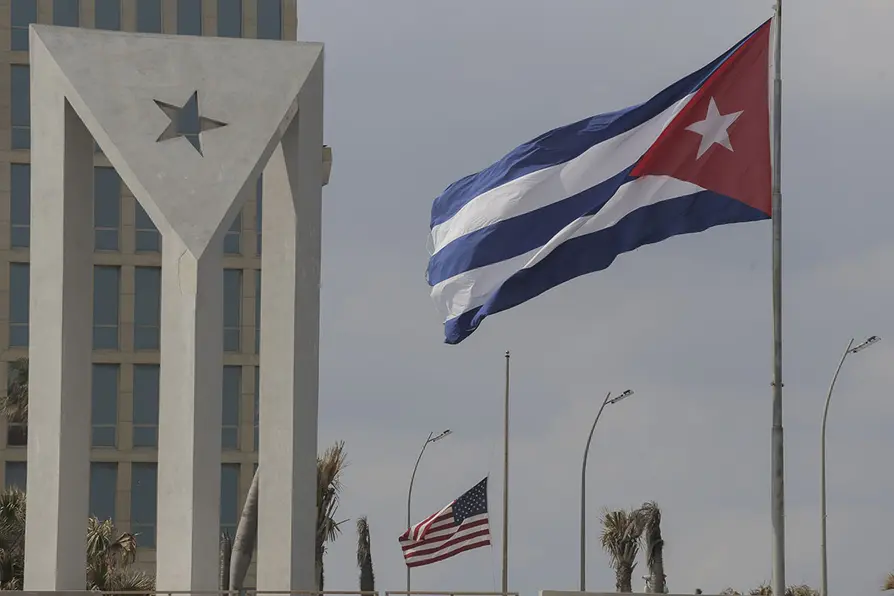As tens of thousands return to the streets for the first national Palestine march of 2026, this movement refuses to be sidelined or silenced, says PETER LEARY
Where normally only the US and its ally Israel vote to strangle Cuba economically, there have been special efforts to slander and isolate the besieged socialist island nation year — so we must redouble our solidarity, writes TARIQ ANDERSON

 The American embassy in Havana, Cuba, January 14, 2025
The American embassy in Havana, Cuba, January 14, 2025
THE UN general assembly (UNGA) is set to debate and vote on Cuba’s annual resolution on the necessity of ending the now 63-year-old economic, commercial and financial blockade of the country over the next two days (October 28-29).
As has been customary since the resolution was first put forward in 1992, the overwhelming majority of the international community is expected to vote in favour of ending the sanctions against the Caribbean island. Last year, 187 countries voted in support of the resolution, with just the US and Israel voting against.
However, this year Washington has initiated a new diplomatic offensive aimed at stifling international support for Cuba, with Foreign Minister Bruno Rodriguez Parrilla accusing the US of exerting “gross pressure” on other countries to withdraw their longstanding support for Cuba’s resolution.
Rodriguez said Washington is running a “campaign of misinformation and intimidation,” claiming the State Department has instructed its diplomats to lobby governments — particularly in Europe and Latin America — not to support the resolution condemning the blockade, citing Cuba’s alleged support for Russia’s war in Ukraine as justification. He said US officials have even sent letters to foreign governments containing “threats and falsehoods” about Cuba.
According to reports, internal State Department documents indicate that US diplomats have told countries that there are 5,000 Cuban troops fighting in Ukraine.
Cuba’s Foreign Ministry has strongly denied the claim and said that any Cuban involved in either side of the conflict was doing so on their own initiative without “the encouragement, commitment, or consent of the Cuban state.” It also gave details of nine criminal cases involving 40 defendants for crimes related to such activities between 2023 and 2025, which have resulted in 26 convictions so far.
The Cuba Solidarity Campaign (CSC) has written to Foreign Secretary Yvette Cooper urging the British government to stand firm alongside the international consensus and once again vote in favour of the UNGA resolution demanding an end to the blockade.
Explaining the motivation behind these recent lobbying efforts, Rodriguez suggested that the US is “trying to prevent the international community from once again condemning the severe humanitarian consequences and extraordinary damage caused by the deliberate tightening of the blockade, the sole purpose of which is to inflict suffering on Cuban families.”
In September, Cuba published its annual report detailing the impact of the blockade ahead of the vote at the UNGA. It outlined a staggering 49 per cent increase in the damages inflicted on the Cuban economy compared to the previous 12 months. Total damages for the period the report covers (March 2024 to February 2025) amount to $7.6 billion. The cumulative total since 1962 is $170.7bn.
Presenting the findings of the report at a press conference on September 16, Rodriguez said that “it is impossible to quantify the emotional damage, anguish, suffering and deprivation that the blockade causes Cuban families.”
From education to tourism, agriculture to energy, the report sets out the wide-ranging devastation caused by the US policy across Cuban society. It is perhaps in health where the impact of the blockade can be seen most starkly.
With damages amounting to nearly $290 million, the report notes the blockade has “hampered the ability of the health system to obtain … supplies when needed and provide quality service to the population.” This has “led to the deterioration of several health indicators, including those related to mortality.”
Nearly 95,000 people are on surgery waiting lists — once rarely heard of in Cuba — including 4,507 cancer patients and 9,913 children. Survival rates for children suffering from cancer have fallen, and Cuba’s infant mortality rate has jumped from 4.2 per 1,000 births in 2014 to 8.2.
With the increasingly suffocating blockade damaging the lives of Cubans in the most fundamental way, practical solidarity is critical. The Cuba Vive Medical Aid Appeal — launched in 2024 by the CSC with the support of a number of Unison regions — has now raised more than £220,000, and five consignments of life-saving aid (worth in excess of £1m) have been shipped to Cuba.
At a recent fundraiser for the appeal, Cuban ambassador Ismara Vargas Walter detailed the enormous human cost of the blockade, describing it as “a war on the human body, on our children, our sick, and our elderly.”
She heralded the appeal as “a profound act of defiance” stressing that such practical solidarity is not abstract. “Every item of medical aid that is sent will be helping to save a life. Your support for this appeal is a powerful message that you refuse to be complicit in this crime.”
The Cuba Vive Medical Aid Appeal will be continuing throughout 2026. Help it reach the £250,000 mark by the end of the year at cubavive.org.uk. You can read CSC’s statement on the UN vote at bit.ly/CSC-UN2025.

The Cuba Solidarity Campaign’s director, ROB MILLER, and its secretary, BERNARD REGAN, salute a staunch supporter of the socialist Caribbean island

While ordinary Americans were suffering in the wake of 2005’s deadly hurricane, the Bush administration was more concerned with maintaining its anti-Cuba stance than with saving lives, writes MANOLO DE LOS SANTOS

Cuba Solidarity Campaign secretary BERNARD REGAN says the inhuman blockade of Cuba not only continues, but the Donald Trump administration is ratcheting up aggression against both Havana and Latin America more widely











